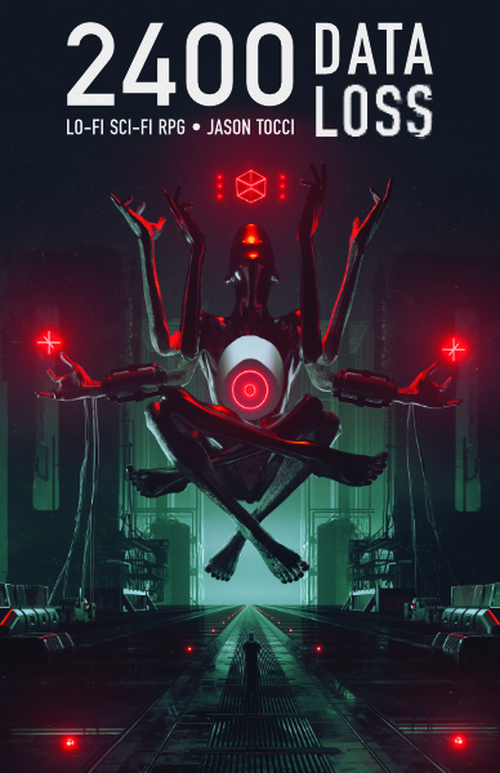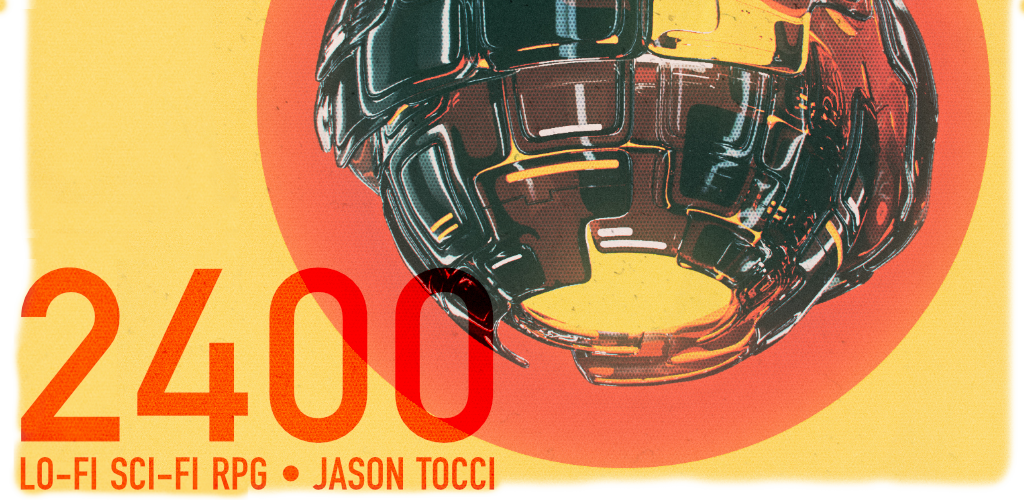Data Loss v1.0

Data Loss is a soulslike sci-fi TTRPG scenario about waking up in a cloning station on a ruined world and trying to figure out what the hell happened.
Soulslike TTRPGs are kind of an obsession of mine. And since the recent announcement of an official English-language Dark Souls TTRPG, I've seen a lot of discussion about what a "soulslike" tabletop game even is. My extremely unsatisfying but adamant answer is "a game that was inspired by and means to capture the feeling of Dark Souls" — so there's a lot that counts in my book. When Paul Beakley of the Indie Game Reading Club wondered about this aloud, I suggested by way of example that I'd call a TTRPG "soulslike" if you played a repeatedly dying clone harvesting mind-backups and fighting giant aliens or robots. Thanks to the power of obsession, my offhand comment soon turned into a game.
(People sometimes ask how long it takes me to write one of these games, and the answer is apparently 8 days, as long as it reminds me of Dark Souls. Don't ask how many months I've been sitting on the half-finished 2400: Habs & Gardens.)
Combing with other 2400 games
Data Loss can be played as a self-contained scenario or as part of a broader 2400 arc. If you want to expand it, it combines especially well with…
- Project Ikaros (for psi powers that'd work as TK mods)
- Inner System Blues (for cybernetics that'd work as arcwire mods)
- ALT (if you want to introduce clone upgrades)
- Eos and Xenolith (for "talents" and "traits" that can be adapted as more leveling options)
There's more than one way to insert Data Loss into a game, but to my mind, it makes the most sense as a starting point with the goal of getting offworld.
Departures from other 2400 games
I should also note that Data Loss is structured a bit different from other 2400 games, but the rules are still the same ones you see in the 24XX SRD; I just devoted more space to explaining them than usual. I wrote up a few different "stamina" and encumbrance rules I might add, much as I've done in other soulslike games, but ultimately decided against it. More rules won't make combat go faster, and fast combat is something I love about both 2400 and Dark Souls. Instead, I tried to explain how you could emphasize risk/reward decision making in combat with the lightweight rules that are already there. (But I won't be offended if you decide to bolt on some extra rules yourself, or to adapt the stress die rule from 2400: Orbital Decay like I almost did.)
The last page in Data Loss — what I think of as the "GM's page" — is also something of a departure from other 2400 games. Instead of four, 20-item lists, this page is organized in areas of the world, a map you can't see. Within each area are some suggested encounters, some clues about where to go or what might have happened here, and a "boss fight" with brief notes on how it will try to kill you and one way (though I don't expect the only way) to kill it first. There's a lot condensed in there, but also a lot of gaps to fill: Much like when you play Dark Souls, I hope, the clues scattered across scraps of flavorful text paint a picture, but still leave more than a little room for speculation and further investigation.
Generating maps
Finally, I wanted to offer some advice for GMs who'd like to have maps for each area of the world before playing. You could hit up image search for actual floor plans, but it can take a while to find anything good. I recommend…
- Outskirts and City generated by Watabou or ProbableTrain
- Plant generated by Donjon, or adapted from Gradient Descent, a Mothership scenario
- Labs generated by Donjon, or adapted from the red tower in Dead Planet, another Mothership scenario
- Mines generated by choosing "cavernous" on Donjon or customizing "caverns" on Dave's Mapper
If you run this with any other map or plug in any other content that you find works well, please feel free let me know in the comments or on the 2400 forum!
Files
Get 2400
2400
Lo-fi sci-fi micro RPG collection
| Status | Released |
| Category | Physical game |
| Author | Jason Tocci |
| Genre | Role Playing |
| Tags | Aliens, Cyberpunk, Fantasy, fkr, Horror, rules-lite, Sci-fi, Space |
More posts
- Nuclear Family 1.0Jul 21, 2023
- If you JUST need the NEWEST game…Jul 17, 2023
- Junior Hybrid Battle Cryptids 1.0Jul 15, 2023
- Terminology updateApr 20, 2022
- Battle Moon v1.0Mar 26, 2022
- Legends v1.0Mar 19, 2022
- Xot v1.0Mar 08, 2022
- Resistors v1.0Mar 04, 2022
- Habs & Gardens 1.0Mar 01, 2022
- Version++Mar 01, 2022

Comments
Log in with itch.io to leave a comment.
Legit! Thanks for adding to the 2400 series!!